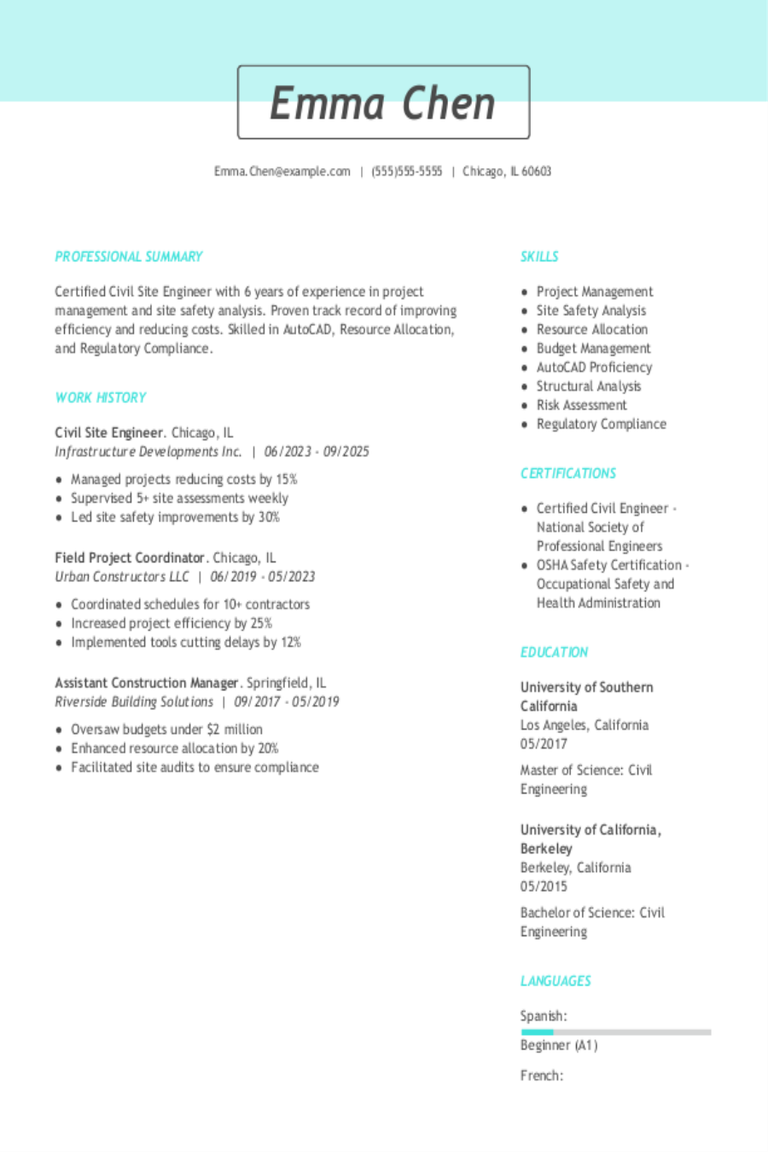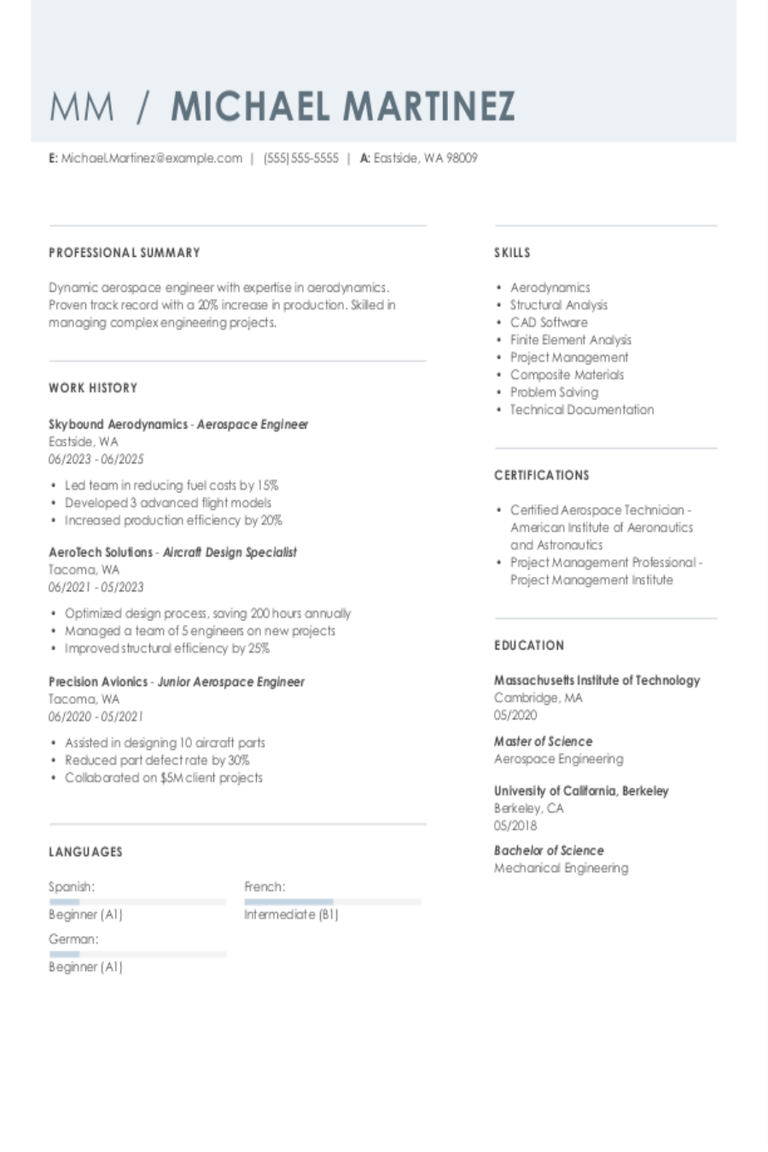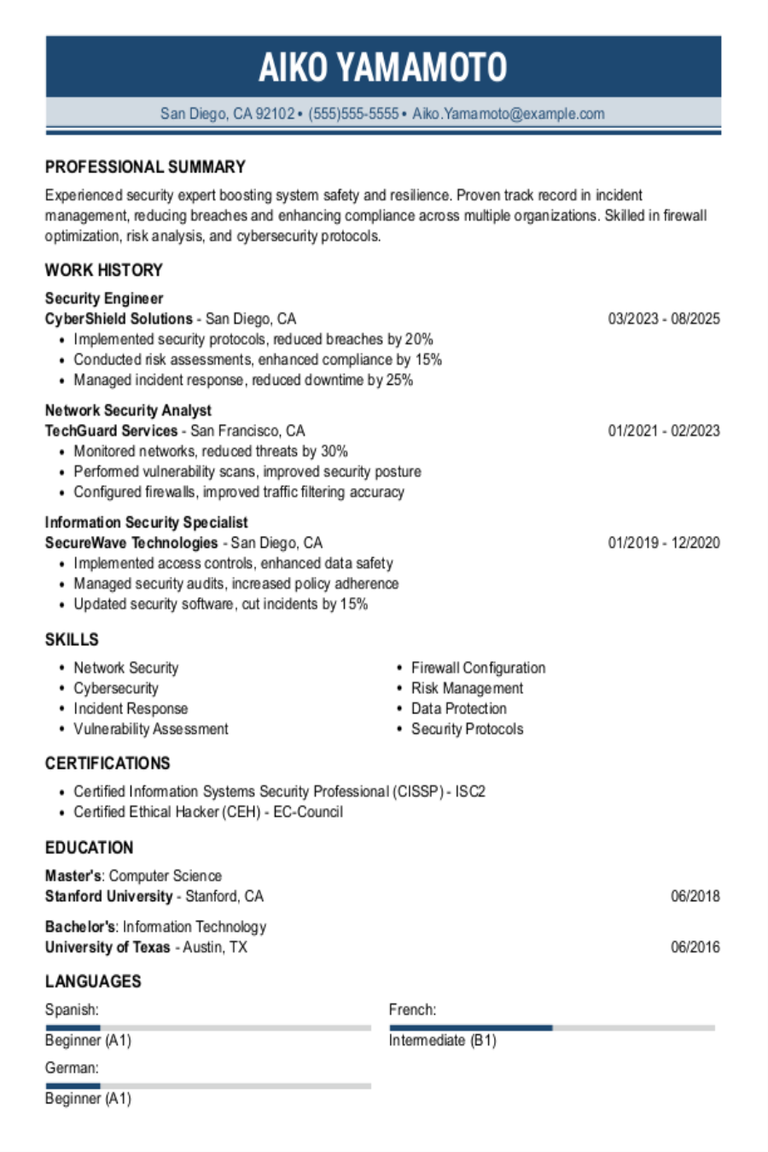Table of Contents
Get started with MyPerfectResume today!
- Build a resume on any device
- Pick an ATS-friendly template
- Tailor with AI copy suggestions
Why this resume works
- Quantifies accomplishments: Measurable accomplishments, such as managing a $5M budget and improving site safety by 18%, highlight the applicant’s impactful contributions and value.
- Showcases career progression: The applicant’s journey from structural engineer to civil engineer and construction project manager showcases a clear trajectory of increasing responsibility and career growth.
- Illustrates problem-solving ability: Reducing project delays by 25% through new protocols illustrates the applicant’s problem-solving skills and innovative approach.
More Civil Engineer Resume Examples
Review more civil engineer resume examples to see how to highlight your project management, technical expertise, and problem-solving skills. These civil engineering resume samples can help you create a resume that showcases your experience and positions you as a strong engineering applicant.
Entry-Level Civil Engineer
Why this resume works
- Centers on academic background: The education section highlights advanced degrees in civil engineering, which are particularly impactful for those early in their careers.
- Effective use of keywords: Incorporating industry-specific keywords like “project management” and “structural analysis” ensures compatibility with applicant tracking systems (ATS), improving the resume’s visibility.
- Shows digital literacy: Mastery of tools such as AutoCAD demonstrates the applicant’s digital readiness, essential in modern workplaces where computer skills are essential.
Mid-Level Civil Engineer
Why this resume works
- Points to measurable outcomes: By showcasing efficiency improvements of 15%, the applicant effectively demonstrates their ability to produce measurable outcomes and drive impactful change in engineering projects.
- Demonstrates language abilities: The applicant’s multilingual abilities, including Spanish, German, and French, improve cross-cultural communication and offer valuable language skills for international collaborations.
- Includes a mix of soft and hard skills: Combining technical expertise with strong interpersonal skills, the applicant excels in both analytical engineering tasks and effective teamwork across diverse projects.
Experienced Civil Engineer
Why this resume works
- Lists relevant certifications: Listing certifications like the Principles and Practice of Engineering (PE) and LEED Accredited Professional reinforces both technical expertise and a dedication to sustainable practices.
- Showcases impressive accomplishments: Achievements such as leading a $2M bridge project and reducing errors by 30% highlight exceptional performance with measurable impact.
- Emphasizes leadership skills: By managing teams of up to 12 engineers and spearheading major developments, the applicant illustrates strong leadership skills that drive collaboration and project success.
Civil Engineer Resume Template (Text Version)
Chris Rodriguez
San Francisco, CA 94110
(555)555-5555
Chris.Rodriguez@example.com
Professional Summary
Experienced Civil Engineer with expertise in structural analysis, budget management, and project supervision. Proven track record in leading multi-million dollar projects and enhancing site safety standards. Skilled in material efficiency and team management.
Work History
Civil Engineer
Skyline Engineering – San Francisco, CA
July 2022 – July 2025
- Managed M project budget
- Enhanced site safety by 18%
- Supervised a team of 15 engineers
Construction Project Manager
UrbanBuild Inc. – Riverside, CA
July 2019 – June 2022
- Led projects totaling M
- Reduced project delays by 25%
- Implemented new construction protocols
Structural Engineer
PeakDesign Engineering – San Diego, CA
July 2017 – June 2019
- Designed structures worth M
- Improved material efficiency by 12%
- Conducted site inspections
Languages
- Spanish – Beginner (A1)
- French – Beginner (A1)
- German – Beginner (A1)
Skills
- Project Management
- Structural Analysis
- Site Inspection
- Safety Protocols
- Civil Engineering Design
- Material Efficiency
- Budget Management
- Team Supervision
Certifications
- Project Management Professional – PMI
- Advanced Civil Engineering Techniques – ASCE
Education
Master of Science Civil Engineering
Stanford University Stanford, California
June 2017
Bachelor of Science Civil Engineering
University of California, Berkeley Berkeley, California
June 2015
Related Resume Guides
Advice for Writing Your Civil Engineer Resume
Explore our tips on how to write a resume for a civil engineer position and discover how to spotlight your engineering skills and problem-solving abilities. Whether you’re designing bridges or managing construction projects, we’ll provide advice for crafting a compelling resume that stands out.
Highlight relevant technical skills
Having strong technical skills is important for a civil engineer because they help design, build, and maintain structures like bridges and buildings. Creating a dedicated skills section on your resume makes it easy for employers to see what you offer. You should list skills that match the job you’re applying for. If you’ve used these skills in past jobs, include them in your work experience section, too.
Common technical skills for civil engineers include knowledge of AutoCAD, MATLAB, and Revit. Being able to work with software like SAP2000 or STAAD.Pro is helpful. Civil engineers often use tools like GPS and GIS systems when working on projects, so knowing how to use these is beneficial as well. Understanding construction methods and materials is also key.
When writing about your skills, be clear about what you know. For example, if you’ve used AutoCAD in a project to design a bridge, mention that in your resume. This shows that you not only have the skill but have used it effectively in real-world situations.
Example of a technical skills section
- CAD software (AutoCAD, Civil 3D)
- Structural analysis
- Geotechnical engineering
- Hydraulics & hydrology
- Project management software (MS Project, Primavera P6)
- Building information modeling (BIM)
- Transportation engineering
- Construction safety standards
- Surveying techniques & equipment
- Environmental impact assessments
You can use our Resume Builder to craft a resume that highlights both technical skills and soft skills to ensure your application stands out to hiring managers.
Quantify your accomplishments
Quantifying accomplishments in a resume makes it more compelling by showing clear results rather than just listing duties. For a civil engineer, it’s important to include specific achievements in the work experience section, such as “Led a team to complete a bridge project 20% ahead of schedule” or “Reduced construction costs by 15% through innovative material use.”
Each job entry in your work history section should list your job title, employer name, location, and employment dates. Turning duties into achievements is key to standing out. Use action verbs like “designed,” “managed,” or “improved” and follow them with metrics that highlight your impact.
For example, describing how you improved project efficiency by 30% gives hiring managers a quick view of your skills and contributions. A results-driven resume helps employers see the value you bring right away. By focusing on quantifiable accomplishments, you’ll make it easier for potential employers to recognize your ability and fit for their team.
5 civil engineer work history bullet points
- Supervised the construction of a $5M residential project, ensuring completion 10% ahead of schedule and under budget.
- Conducted site inspections for compliance with safety regulations, reducing workplace incidents by 25%.
- Developed detailed structural analysis reports that improved project accuracy by 30% during planning phases.
- Coordinated with multidisciplinary teams to deliver infrastructure improvements that boosted traffic flow efficiency by 15%.
- Managed procurement processes for materials on a commercial build, decreasing costs by 12% through vendor negotiations.
Need help making your resume? Check out these professional resume examples for easy-to-follow templates and ideas.
Write a powerful professional summary
A professional summary on a resume serves as an engaging introduction to hiring managers, offering them a snapshot of your skills and achievements. Depending on your experience level, you can decide between a summary and a resume objective.
A professional summary typically consists of three to four sentences that demonstrate your experience, skills, and accomplishments. It’s best suited for experienced applicants who want to showcase their professional identity and value in the workforce.
On the other hand, resume objectives are statements focused on career goals. They’re ideal for entry-level candidates, those changing careers, or individuals with employment gaps. While summaries focus on “what I’ve accomplished,” objectives lean more towards “what I aim to contribute.”
Explore examples of both professional summaries and resume objectives tailored for different industries and levels of experience.
Civil engineer resume summary examples
Entry-level
Recent civil engineering graduate with a Bachelor of Science in Civil Engineering from an ABET-accredited university. Completed internships focusing on structural analysis and construction project management. Skilled in AutoCAD, Revit, and MATLAB, with foundational knowledge in sustainable design practices. Eager to contribute strong analytical skills and fresh perspectives to innovative engineering projects.
Mid-career
Civil engineer with over seven years of experience in infrastructure development and urban planning. Proven track record in managing large-scale public works projects from conception through completion. Expertise in geotechnical analysis, hydraulic modeling, and project budgeting. Licensed Professional Engineer (PE) known for improving project efficiency and fostering collaborative work environments.
Experienced
Senior civil engineer specializing in transportation systems and environmental impact assessments with 15+ years of industry experience. Led multidisciplinary teams on multimillion-dollar highway expansions, integrating advanced traffic modeling software and sustainable materials. Holds a Master’s degree in Civil Engineering, is a certified Project Management Professional (PMP), and adept at driving innovation to meet complex regulatory requirements while improving community connectivity.
Civil engineer resume objective examples
Recent graduate
Detail-oriented civil engineering recent graduate eager to apply academic knowledge of structural analysis and project management in an entry-level role. Committed to supporting engineering teams in delivering sustainable infrastructure solutions and learning from experienced professionals.
Career changer
Passionate professional transitioning into civil engineering, bringing a diverse background in construction and design principles. Looking to leverage hands-on experience and newly acquired technical skills to contribute effectively to innovative engineering projects.
Entry level with internship experience
Entry-level civil engineer with internship experience in urban planning seeking to join a dynamic firm focused on environmentally responsible development. Aiming to apply skills in CAD software and site assessment while gaining further expertise under the guidance of seasoned engineers.
Choose a resume template with clear sections and easy-to-read fonts. Avoid too many colors or fancy designs to help hiring managers find important details quickly.
Showcase your credentials
Listing your certifications, licenses, and specialized training is critical for civil engineers because it shows employers you meet industry standards and have the technical knowledge to handle complex projects. These credentials often serve as proof of expertise in areas like structural analysis, project management, or safety compliance.
Creating a dedicated certifications section on your resume ensures these qualifications stand out and complements your education section by highlighting ongoing professional development. Here are a few examples of certifications for your resume:
- Professional Engineer (PE) License
- Certified Engineering Technician (CET)
- LEED Accredited Professional (LEED AP)
- Project Management Professional (PMP)
- OSHA Safety Certification
Including recognized certifications on your resume strengthens your profile and gives hiring managers confidence in your ability to meet job requirements. For civil engineers, these credentials demonstrate not just technical skills but also a commitment to quality and industry best practices.
Example of a certifications section
Professional Engineer (PE) License
Issued by: National Society of Professional Engineers (NSPE)
Issued 2021
LEED Accredited Professional
Issued by: Green Business Certification Inc. (GBCI)
Expires 2025
Project Management Professional (PMP)
Issued by: Project Management Institute (PMI)
Issued 2020
Certified Construction Manager (CCM)
Issued by: Construction Management Association of America (CMAA)
Expires 2024
AutoCAD Civil 3D Certified Professional
Issued by: Autodesk
Issued 2019
Use a polished and professional resume format that aligns with your experience level to ensure your resume stands out to recruiters and hiring managers.
Salary Insights for Civil Engineers
Thinking about your future job? Exploring different salaries can help you understand what you might earn and which roles are in demand. Browse key insights below to get started.
Top 10 highest-paying states for civil engineers
Civil Engineers earn varying salaries across the United States, with a national average of $83,756. The table below highlights the states where civil engineers command the highest compensation.
Our salary information comes from the U.S. Bureau of Labor Statistics’ Occupational Employment and Wage Statistics survey. This official government data provides the most comprehensive and reliable salary information for writers across all 50 states and the District of Columbia. The figures presented here reflect the May 2025 dataset, which is the most recent available as of this publication.
| State | Average Salary |
|---|---|
| District of Columbia | $102,280 |
| Oregon | $85,470 |
| California | $84,480 |
| Washington | $78,240 |
| Minnesota | $76,410 |
| Arizona | $75,500 |
| Connecticut | $75,460 |
| Illinois | $75,280 |
| Guam | $75,240 |
| Virginia | $74,640 |
FAQ
Do I need to include a cover letter with my civil engineer resume?
Yes, including a cover letter with your civil engineer resume can make a significant difference in your job application. A cover letter lets you highlight why you’re specifically interested in the role and the company, and it gives you a chance to discuss projects or experiences that align with their needs.
If the company is working on infrastructure development, for example, mention any related project management experience or technical skills that could contribute to their objectives. Consider using tools like our Cover Letter Generator for crafting personalized content.
We also recommend exploring cover letter examples to find inspiration tailored to civil engineering roles. Ultimately, taking the time to write a thoughtful cover letter demonstrates enthusiasm and initiative, qualities highly valued by employers.
How long should a civil engineer’s resume be?
For a civil engineer, a one-page resume is generally suitable early in your career to focus on key skills like project management, CAD skills, and engineering principles.
As you gain experience or pursue advanced certifications, stretching to a two-page resume can help you showcase complex projects and leadership roles.
Make sure every detail counts—highlight recent work that shows problem-solving abilities and technical expertise. Tailor your resume for each job application by emphasizing specific projects or skills that align with the job description.
Explore our guide on how long a resume should be for examples and tips on finding the ideal length for your career stage.
How do you write a civil engineer resume with no experience?
If you’re beginning your career as a civil engineer without direct experience, concentrate your resume on education, projects, and skills that showcase your potential. Here are a few tips to help you get started:
- Emphasize your education: Start by listing your degree in civil engineering, including the university name, expected or recent graduation date, and any honors or relevant coursework like structural analysis or environmental engineering.
- Include academic projects: Detail any significant projects from your courses or capstone. Describe what you did, how you approached problem-solving, and any tools or software used, such as AutoCAD or MATLAB.
- Highlight internships and volunteer work: If you’ve completed internships or volunteered in related areas like construction management or urban planning, describe these experiences. Focus on what you learned and any contributions you made.
- Showcase technical skills: List engineering-related skills like skill in CAD software, understanding of materials science principles, or knowledge of green building practices. Including soft skills like teamwork and communication can also be beneficial.
Check out our guide on writing a resume with no experience for more tips and examples to strengthen your application.
Rate this article
Civil Engineer
Share this page
Additional Resources

Civil Site Engineer Resume Examples & Templates
Browse civil site engineer resume examples to see how to highlight your experience planning projects, overseeing construction, and ensuring safety on site. These examples and tips help you highlight your

Civil Engineering Resume Examples & Templates
Explore civil engineering resume examples to learn how to highlight your experience in designing projects, solving problems, and working with teams. These samples can help you showcase your skills in

Civil Engineering Intern Resume Examples & Templates
Explore civil engineering intern resume examples to see how to highlight key projects, technical skills, and teamwork to stand out to employers.Build my resumeImport existing resumeCustomize this templateWhy this resume

Engineering CV Examples & Templates
Engineers play many roles in designing, building and improving infrastructures, technologies, medical equipment and more. Employment in this occupation is expected to grow 4% over the next decade, bringing in

Aerospace Engineer Resume Examples & Templates
Explore aerospace engineer resume examples that show you how to highlight your experience designing aircraft, testing systems, and solving technical problems.Build my resumeImport existing resumeCustomize this templateWhy this resume

Security Engineer Resume Examples & Templates
Explore security engineer resume samples that highlight tech skills and experience in protecting data. Get tips to showcase your problem-solving abilities and cybersecurity expertise.Build my resumeImport existing resumeCustomize this templateWhy
